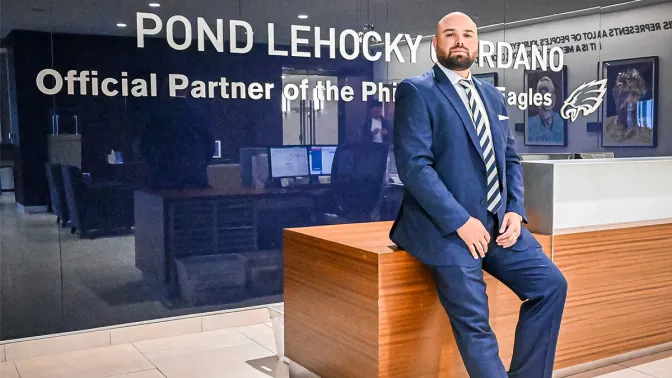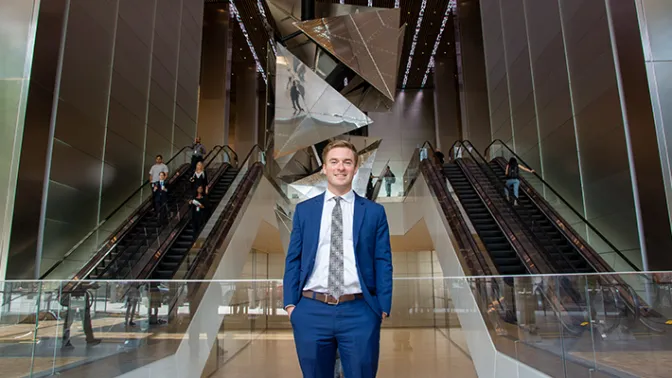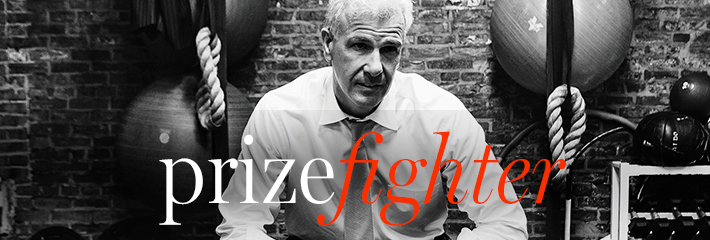
Alum Sam Pond: Prize Fighter
SEPT. 12, 2014
When Sam Pond ‘81 speaks, three things are obvious: He’s got the confident air of a politician, the contemplative nature of a philosopher, and the Philly accent he acquired growing up in Torresdale. Ask him a question and you can practically see the wheels turning in his head before his gaze shifts back to meet yours and he delivers the perfect response.
He has degrees in finance and law, but his formal education isn’t the only key to his success. Some of the skills that make him a highly respected workers’ compensation lawyer and successful entrepreneur came from experiences Pond had a world away from university life, while working in a union. And in the ring.
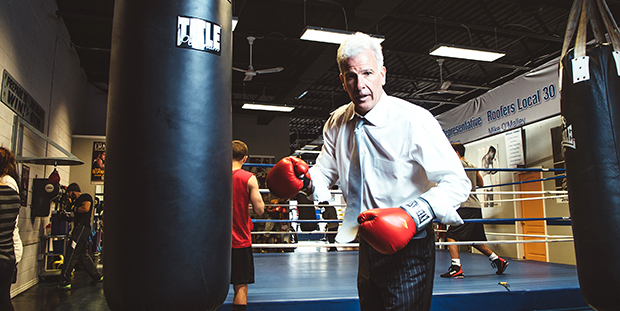
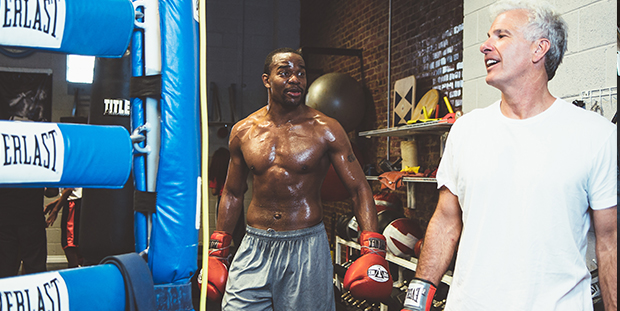
Boxing requires skills that clearly translate to the courtroom, and not only because both involve winning the opinion of a judge. He says it’s a combination of sport and art: “There are so many intricacies: throwing a punch, doing a combination, sizing up your opponent, moving your feet. You’re dancing to a certain extent, all while someone is trying to hit you.”
But most importantly, Pond says, boxing taught him the hyper-focus that would make him a formidable opponent in the courtroom.
Not many people who hold a juris doctorate will tell you they considered skipping college altogether. But for Pond, it seemed like a viable option. “I wanted to go into the construction trades just like everybody else in my neighborhood,” he says. In fact, he began working his first job as a union laborer before he even graduated high school, during the summer after his junior year, on a tie-in crew laying a pipeline through Pennsylvania.
“When you lay a pipeline and you come to a river, swamp, crick, you have to slow down, get things right. We would work 90 hours a week. I made over $1,000 a week in 1975.”
But his father worked for PGW with Local 686 gas workers union and had earned his associate degree from Drexel years earlier. Academically, Pond was a good student, and his father impressed upon him that it would be a waste to not at least enroll in college.
Pond took his father’s advice and started his undergraduate studies in finance at Drexel LeBow in 1976.To pay his tuition, he took another union job that worked around his class schedule – a tough and dirty job with the local mailer’s union at the Philadelphia Inquirer on weekends. He would put in two long shifts within a 24-hour time frame starting Friday nights at 10 p.m. He would earn a whopping $400 a weekend.
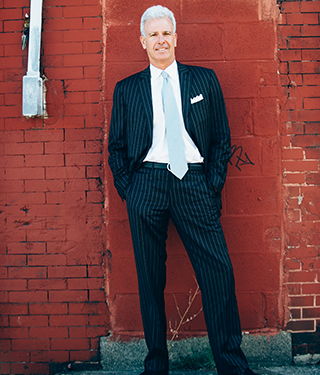
Pond worked at the Inquirer’s printing room for nine years – through his entire career at Drexel and even during his three years at Temple’s law school.
Two of his Drexel co-ops were in production management at iconic Philadelphia companies: Tastykake and Schmidt’s brewery, where “I got into quality control so I had to make sure the beer was good,” he says with a smile. His friends were jealous.
It was a pivotal time in the brewing industry, he explains. “All these little breweries were being put out of business by the Millers and the Budweisers, and we were buying up these smaller labels like Reading Beer and Knickerbocker.”
They were making big decisions around marketing and branding, which Pond had the opportunity to weigh in on. His co-op even turned into a part-time job there, which he kept until he graduated.
The owner at the time was William Pflaumer, better known as “Billy the Beer King.” Pond describes him as “magnamorous” because he would subsidize things for his workers. “He was a neighborhood guy who cared about his employees, and I took something away from that,” Pond says.
He isn’t much of a beer drinker anymore – nowadays he prefers Bordeaux.
Pond met his wife in first grade. Mimi lived in his neighborhood, a few streets away, and they started dating in high school. They have been together for more than 30 years and now make their home in Newtown Square. Sam calls Mimi “the wind beneath my wings.” They have one son, Dylan, who is currently a freshman at the University of Southern California.
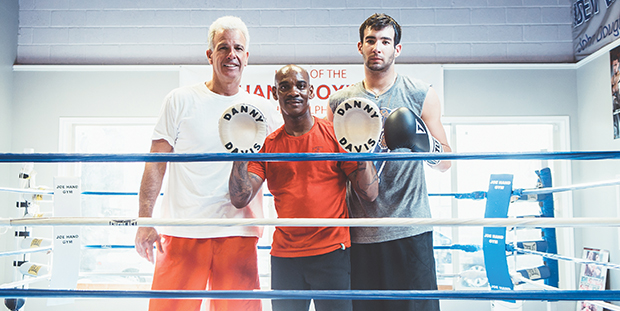
Pond (left) and his son Dylan (right) at Joe Hand Boxing Gym with pro trainer Danny Davis.
The Pond family also enjoys spending time at their house down the shore in Sea Isle City, where they kayak, surf, wakeboard and play tennis.
Sam Pond was raised by two particularly thoughtful parents who agreed on most things, except politics. “My mother would pray to the Virgin Mary. My father would pray to Roosevelt.” Pond describes his father as a union guy with a socialist mentality. He only saw him cry twice: “When my mother passed away, and when Nixon beat Humphrey in 1968.”
Pond’s mother, Marie, an Italian-American Republican from South Philadelphia, really loved American capitalism and was a member of Republican organizations in South Philly.
Politically, Pond sides with his father, who is also named Sam, but says that at the end of the day, the most important thing his parents gave him was a belief system; not really religious in nature, he describes it as a “destiny belief system.”
“There’s doubt in anyone’s mind. But there was not much doubt that we had the ability to make our dreams come true, that the impossible was possible, especially in this country.”
“Everyone else was worried about the so-called paper chase the first year of law school. I was looking at life-and-death things.”
Pond’s first year as a law student at Temple was difficult, but not because of his workload.
His mother, who had recently suffered an injury at the dry cleaning factory where she worked at 13th and Venango for $160 a week, was laid up with a broken hip. Shortly after that injury, she was diagnosed with cancer.
Perhaps ironically, the family never even filed a worker’s compensation claim. They had other, more important things to worry about. She died a few months after her diagnosis.
In what may have turned out to be a formative experience, Pond’s father attempted to change the designation on his union pension to his children. “He knew the pension laws pursuant to his collective bargaining agreement inside and out,” Pond says.
But the claim was denied on a “crazy technicality.” Only months after his mother’s death, his father died of cancer, too. The claim was denied because his father wasn’t alive on the first day of the month following the change in designation.
His father had worked as a machinist with the gas workers union, paying into his pension for 35 years. And the PGW commission that oversaw the pension fund tried to give his family nothing in return. Pond fought it and won.
Losing both of his parents at such a young age put things in perspective for him. “Everyone else was worried about the so-called paper chase the first year of law school. I was looking at life-and-death things.”
Pond still receives those checks from his fathers’ pension – but he doesn’t keep them. He designated that money to create the Marie Pond Scholarship Fund, which provides selected members of the Torresdale Boys Club some funds toward college.
After graduating law school, Pond spent two years representing insurance companies before jumping across the table. He spent a little over two decades with the firm Martin Banks Pond Lehocky & Wilson before he and Jerry Lehocky broke off to blaze a trail of their own. They formed Pond Lehocky Stern Giordano in 2010 with 22 employees.
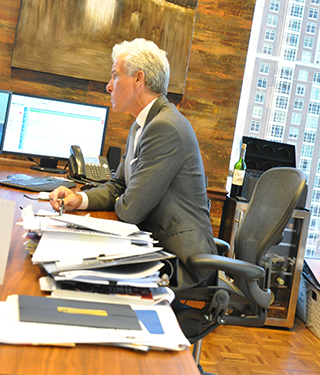
Words of wisdom from his parents still come to mind today when he’s making long-term decisions involving the firm’s future. His father would remind him of an old proverb: “The best time to plant a tree was 20 years ago. The next best time is today.”
“Those little things that were said to us that really sunk in.” For example, when an employee comes to him with an idea, he thinks of the long-term view of how it might help the firm succeed. When a task seems overwhelming, Pond’s attitude is: “Put the days together; put the weeks together; put the years together, and you’ll be surprised with what you can do.”
Pond says he’s had many cases where the stakes were high for the individuals he was representing, but the ones that stand out the most are cases where he fought to provide benefits to families after a death. “I think when you represent a widow, someone who’s lost her husband and has young children, helping them get through that and get the benefits they need is rewarding. It’s an honor and a blessing to represent someone who is really putting their trust and their life in your hands.”
He cites an abundance of fraud-like behavior within the insurance industry for his firm’s success. Injured workers are often perceived as committing fraud, he says. “And yet, I don’t think I’ve had a fraud action brought against any of my clients in 25 years, whereas I think dishonesty is pretty rampant on the insurance company side as far as denying claims that have no basis for denial.”
In one example, an insurance company refused to modify the home of a construction worker who became paralyzed at work. So Pond’s firm went ahead and had the work done – confident that they would win. And they did, and the insurer had to pay the firm’s legal fees and a significant penalty to the injured client.
Pond credits the business education he acquired at LeBow for giving him a big-picture view of how to form a law firm with a business mindset. “I clearly think having a finance degree and an interest in economics, the business world and entrepreneurship has really been as asset for me, whereas a lot of my colleagues were history, English or political science majors.”
While other types of law practices had to downsize with the recession, workers’ comp was largely unaffected, which gave him the opportunity to hire a lot of good talent. This fall, his firm will move from its current location in United Plaza on South 17th Street to newly renovated offices in One Commerce Square.
These days, Pond spends a lot of time on strategic planning and managing his large firm and tending to other professional duties. He’s currently the president of Union Services Access USA, and he’s a past-president of the Philadelphia Trial Lawyers Association. “My mother always told me I’d be president,” he jokes.
But from time to time, he still finds himself sparring in the courtroom, and in the ring, utilizing those hyper-focus skills. “If I’m in a ring and I’m looking at my opponent, it has me focused on my confidence and staying in the moment. If I’m doing a cross-examination or a direct-examination, I’m not thinking about lunch.”
Photography by Colleen Stepanian
